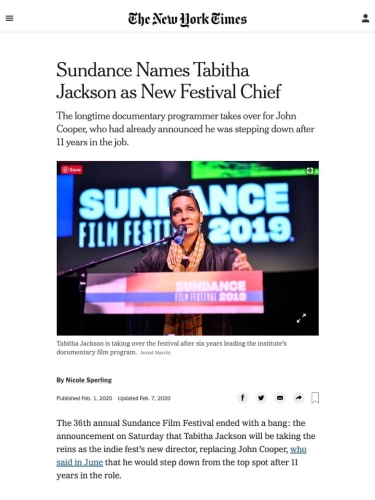Sundance Names Tabitha Jackson as New Festival Chief
The New York Times
02/01/2020
Back
By Nicole Sperling
The longtime documentary programmer takes over for John Cooper, who had already announced he was stepping down after 11 years in the job.
The 36th annual Sundance Film Festival ended with a bang: the announcement on Saturday that Tabitha Jackson will be taking the reins as the indie fest’s new director, replacing John Cooper, who said in June that he would step down from the top spot after 11 years in the role.
Jackson, 49, joined the Sundance Institute in 2013 as director of the documentary film program. For her new position, she competed against some 700 candidates, internally and externally, domestically and internationally.
According to Keri Putnam, chief executive of the Sundance Institute, Jackson’s approach, taste and leadership skills coalesced to make her the lead candidate.
“Tabitha is clear about the purpose the Sundance Film Festival serves in the world yet she’s not wedded to orthodoxy,” she said. “She’s very curious and is a risk-taker and provokes us to think differently about how we might adapt to these fast-changing times.”
In her six years as the institute’s head documentary programmer, Jackson encouraged filmmakers to take chances, and she worked closely with directors like Nicole Newnham and Jim Lebrecht from Netflix’s “Crip Camp” and Michael Dweck and Gregory Kershaw of “The Truffle Hunters,” which Sony Pictures Classics acquired in the 2020 festival, among others, to help push the medium forward.
“I think a danger of this work, both from being in an institution and dealing with institutional funders, is that we consider the work in too narrow a confine,” Jackson said in an interview. “The artist is moving across all forms, using different languages, either invented or borrowed from unexpected places. Our responsibility is to be a home for that work and provide a context by having the right people in the audience who can carry it more broadly into the culture. That’s important to me.”
Before joining Sundance, the British Jackson worked for the BBC and Channel 4, where she served as the series editor of “True Stories” and executive producer of projects for Film 4.
For the Sundance board member and producer Jason Blum, who oversaw the final round of candidate interviews with another board member, Sean Bailey, Disney’s president of production, Jackson’s appointment comes at an important time for the festival, when staying relevant is its biggest challenge going forward. Blum advocated for Jackson because of the experience she had accumulated in her work with the festival for the past six years.
“Programming is a key part of the festival maintaining its relevance,” he said. “If people don’t find the movies compelling, interesting and thought-provoking then it loses its status. Tabitha understands that.”